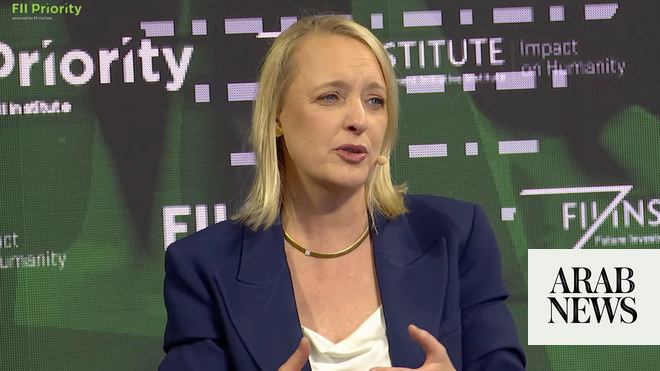AI will drive efficiency amid global economic slowdown, leading financiers tell FII Priority Summit
MIAMI: The chiefs of four of the world’s leading corporations stressed on Thursday, during the first day of the Future Investment Initiative Miami Summit, that while artificial intelligence has the potential to drive higher investment and economic growth across the world despite the current slowdown, it can cause significant harm if not regulated at the right pace.
Marcelo Claure, founder and CEO of Claure Group, told the “Board of Changemakers” panel that when it comes to AI, it is hard in many cases “to differentiate (between) what is hype versus what is reality,” but regardless, all businesses would have to incorporate the technology into their work if they wanted to succeed in the next few decades.
“AI is the bicycle of the minds — we are all going to have to learn how to ride it,” he said.
Claure pointed out that when the browser was invented 30 years ago, it “made the cost of information zero,” which led to the creation of global companies like Google.
He added that AI is going to “reduce the cost of three very important things to basically zero: cognition, creativity, and problem-solving.”
He said: “In our companies, we hire thousands of people, we pay them to do what? We pay them to think, we pay them to problem solve, we pay them to be creative, and AI is going to enhance that.”
As an example of how Claure’s company utilized AI for higher efficiency, he mentioned that his teams used to require about 100 hours to manage a marketing campaign. However, after employing AI, the same process took less than an hour.
“So, think about a 99 percent efficiency,” he said.
Highlighting that generative AI, such as ChatGPT, will develop an IQ level of 12,000 in the next three to four years, Stephen Schwarzman, chairman and CEO of Blackstone Group, stressed the importance of “ethics in AI.”
He told the panel of CEOs: “In terms of the downsides of the technology, that in the hands of bad actors, call them rogue states, will have the use of this very powerful technology — that is a bad thing.”
Schwarzman highlighted that AI technologies are “moving so quickly,” making it more of a challenge to “catch up” and “protect systems.”
He added that experts in the field, such as MIT (Massachusetts Institute of Technology) scientists, “are really cautious about this technology.”
He said: “In other words, they love it. It can do marvelous things, but unlike most of the business community, they are not against regulation. In fact, they are pretty enthusiastic about regulation because they see the downsides, and they want those downsides addressed.
“And one of the things I have tried to do with both AI ethics centers at MIT and at Oxford, is try and be part of that dialogue, encourage people to be thinking about this — there is a lot of stuff going on in the regulatory world.”
Echoing Claure’s observation that AI is advancing rapidly, Schwarzman emphasized the importance of responding with the appropriate regulations at a fast pace.
“This is moving so fast, whatever you come up with, it’ll be obsolete pretty quickly,” he said.
In addition to AI, Jennifer Johnson, president and CEO of Franklin Templeton, identified five broad trends that may define the next decade in investments: demographics, deglobalization, digitization, decarbonization, and debt.
Like the rest of the speakers, Johnson stressed the importance of regulating AI.
“The problem is, it is scary,” she said. “But on the other hand, if we do not create environments where the good folks are learning how to use AI, the bad guys become the experts on it.
“And, so, you have to create and allow for innovation to happen.”
Speaking about deglobalization, Johnson highlighted that the supply chain was shifting.
She said: “It’s the China plus one, the nearshoring, the French shoring. But the key is that capital is moving.”
She added that “capital goes where capital is treated well — where there is a political will to create policies like the Kingdom (of Saudi Arabia) is doing to create opportunities for investment.”
Johnson referred to the shifting of supply chains as “disinflation,” but she also noted that “the raising of interest rates to slow down the economy” means that while there is a global growth slowdown, there are also “pockets of strength … like (in) India.”
Alongside Claure, Johnson and Schwarzman, panelists partaking in the roundtable discussion also included Pierre Beaudoin, chairman of the board of Bombardier, and Pam Liebman, president and CEO of The Corcoran Group.

Eugen Boglaru is an AI aficionado covering the fascinating and rapidly advancing field of Artificial Intelligence. From machine learning breakthroughs to ethical considerations, Eugen provides readers with a deep dive into the world of AI, demystifying complex concepts and exploring the transformative impact of intelligent technologies.


